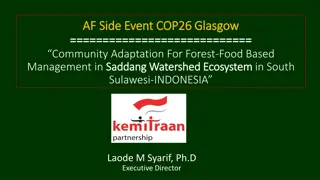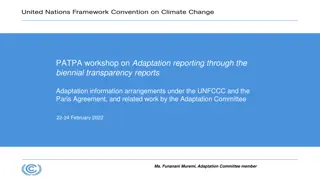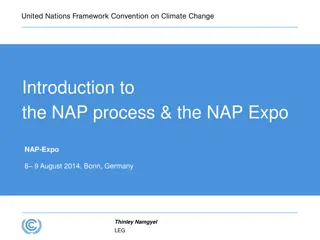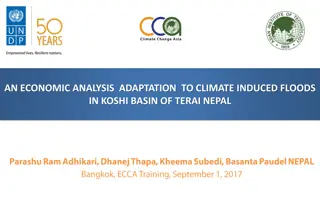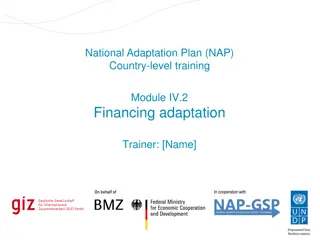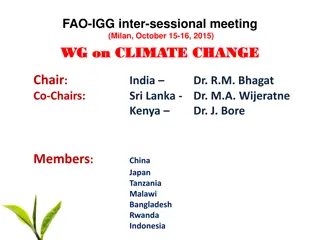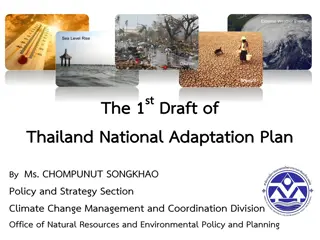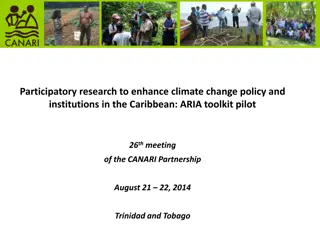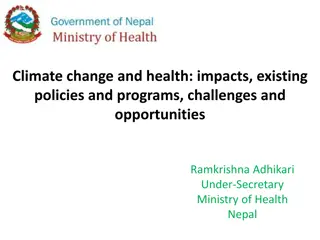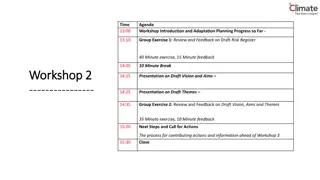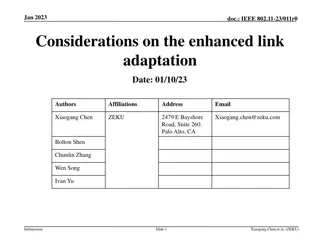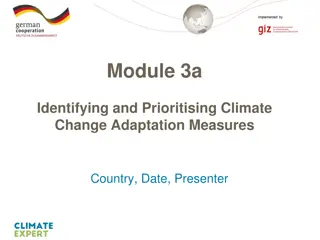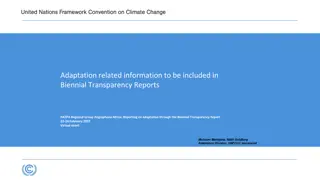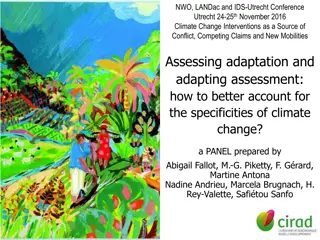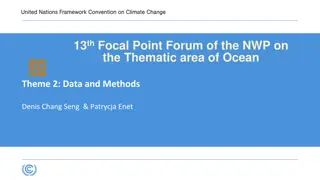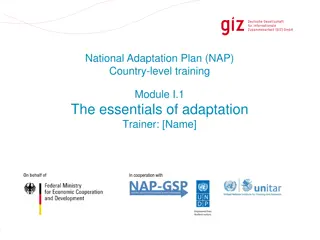Understanding Adaptation Communications in Climate Policy Support Programs
Adaptation Communications (ADCOMs) play a crucial role in the implementation of the Paris Agreement by enabling countries to report on their adaptation priorities, plans, and support needs without burdening developing country Parties. ADCOMs serve to enhance visibility, strengthen adaptation actions, and support, while facilitating learning and understanding of adaptation needs and progress. This article highlights the importance of ADCOMs, details the information that can be included in them, explains how countries can submit ADCOMs, and provides insights on trends in ADCOM support from the NAP Global Network.
- Adaptation communications
- Climate policy support
- Paris Agreement
- NAP Global Network
- Adaptation planning
Download Presentation

Please find below an Image/Link to download the presentation.
The content on the website is provided AS IS for your information and personal use only. It may not be sold, licensed, or shared on other websites without obtaining consent from the author. Download presentation by click this link. If you encounter any issues during the download, it is possible that the publisher has removed the file from their server.
E N D
Presentation Transcript
Adaptation Communications (ADCOMs) Country experiences and lessons learnt Climate Policy Support Programme with support from the NAP Global Network
What is an Adaptation Communication? The adaptation communication is an important instrument under the Paris Agreement (Art. 7) It is a mechanism for countries to report priorities, implementation and support needs, plans and actions, without creating any additional burden for developing country Parties It aims at keeping track on national-level adaptation planning processes and reporting on progress made. It was established to increase the visibility and profile of adaptation inform the global stocktake strengthen adaptation action and support for developing countries enhance learning and understanding of adaptation needs, plans and actions. It serves as a voluntary instrument that countries can submit if they choose to do so. It is not a one-off submitted periodically over time 17.08.2024 AdComm-DAT 2
What information can be included in an ADCOM? ADCOMs can include information such as: National context: including climate impacts and risks, relevant institutions, and legal and policy frameworks National adaptation priorities and plans Implementation and support needs Other information, as appropriate A full list of elements that Parties are invited to include information on can be found in Decision 9/CMA.1 (2018). 17.08.2024 AdComm-DAT 3
How to submit an ADCOM? An Adaptation Communication is not intended to pose an additional burden on developing countries they can be as short or long as a country wishes and should build on existing work. The Paris Agreement sets out three different options for submitting and updating an ADCOM: As a standalone document As a component of vehicle document (e.g., NAP, NDC, NatCom, BTR) In conjunction with a vehicle document (ADCOM + vehicle document submitted together) 17.08.2024 AdComm-DAT 4
Trends from support on ADCOMS (provided by NAP Global Network Country partners are avoiding creating a parallel process and draw on adaptation planning efforts already underway Countries should take stock of the existing adaptation plans and reports (i.e., NAPs, NDCs, NatComs, NAPAs) before preparing information for an ADCOM The process to develop an ADCOM can serve as opportunity to convene adaptation stakeholders to collect information on adaptation progress, needs, and priorities that have not yet been captured and synthesized elsewhere in adaptation planning, and to raise profile, awareness, and understanding of adaptation. 17.08.2024 AdComm-DAT 5
Trends from support on ADCOMS (provided by NAP Global Network), ctd. Countries are leveraging their NAP processes strategically to develop their ADCOMs regardless of where they are in the NAP process Some countries (e.g., Burkina Faso, Grenada, Saint Lucia) that have NAP documents are linking ADCOMs to NAP progress reporting, emphasizing learning on adaptation. Other Countries are leveraging the outputs of their National Adaptation Plan processes so far and using ADCOMs as a shorter-term report on the status of adaptation 17.08.2024 AdComm-DAT 6
Trends from support on ADCOMS (provided by NAP Global Network), ctd. The flexibility of options and approaches for developing an adaptation communication is useful but can lead to confusion Standalone ADCOM emphasize its role in profile-raising of adaptation (i.e., to avoid adaptation being buried in longer documents Embedded ADCOM are chosen to reduce reporting burden, or to embed adaptation in a document that has political profile (i.e., the NDC). Countries saw ADCOMs role as providing input to the GST as an important function and rationale for developing it in 2021, but there was lack of awareness of the timelines associated with the GST 17.08.2024 AdComm-DAT 7
Trends from support on ADCOMS (provided by NAP Global Network), ctd. Some countries used the AdComms as an opportunity include to emerging trends, including impacts of the Covid-19 pandemic on adaptation, not captured to date in other adaptation plans or communications. Some countries (e.g., Nigeria, Haiti, Liberia) have included in their ADCOM a repository of adaptation projects and activities implemented to date, which Reference for donors and stakeholders / highlight good practices and lessons Highlighting regional and sectoral disparities 17.08.2024 AdComm-DAT 8
Trends from support on ADCOMS (provided by NAP Global Network), ctd. Countries have included information on the four voluntary elements such as Gender- responsive adaptation action and Traditional Knowledge, knowledge of Indigenous Peoples, and local knowledge systems related to adaptation . Many countries are including an aggregate estimated cost of adaptation in the country The amounts estimated to be needed vary widely Namibia for example estimates that USD 1.72 billion is needed from 2021 to 2030, while Somalia estimates USD 48.5 billion for the same period. Collecting information (especially at the sub-national level) is challenging without an M&E system for national adaptation in place 17.08.2024 AdComm-DAT 9
AdComm-Drafting Assistance Tool (AdComm-DAT) Offers non-prescriptive step by step guidance Supports countries that specifically decide to prepare and submit a stand-alone document rather than choosing one of the existing communication vehicles Reduces the reporting burden to a minimum by offering a structure that builds on the guidance provided in Decision 9/CMA.1 Available from: https://adcomm-dat.org/ 17.08.2024 AdComm-DAT 10
AdComm-Drafting Assistance Tool (AdComm-DAT) Lessons Learnt With GIZ support, the NAP Global Network has piloted the AdComm-DAT via technical assistance to Vietnam and Mexico. Lessons from that support include: The AdComm-DAT can help guide the collection of data and information from existing sources having a monitoring and evaluation system for adaptation is vital for collecting information. Though an international reporting mechanism, ADCOMs can serve as an important national-level and sub-national resource on adaptation. Clarifying the value-add at the national level is valuable at the beginning of the process Adaptation stakeholder mapping is another essential step at the outset of the ADCOM development process, and the AdComm-DAT can be used to structure questions for stakeholder consultation and input. 17.08.2024 AdComm-DAT 11
Contact Kristin Diederich Junior advisor Dr Maik Winges Climate Policy Support Programme Advisor Amina Schild Climate Policy Support Programme Advisor Kristin.Diederich@giz.de Climate Policy Support Programme With special thanks to Maik.Winges@giz.de Amina-Laura.Schild@giz.de info@napglobalnetwork.org
Deutsche Gesellschaft fr Internationale Zusammenarbeit (GIZ) GmbH Sitz der Gesellschaft Bonn und Eschborn Friedrich-Ebert-Allee 32 + 36 53113 Bonn, Deutschland T +49 228 44 60 - 0 F +49 228 44 60 - 17 66 Dag-Hammarskj ld-Weg 1 - 5 65760 Eschborn, Deutschland T +49 61 96 79 - 0 F +49 61 96 79 - 11 15 E info@giz.de I www.giz.de




